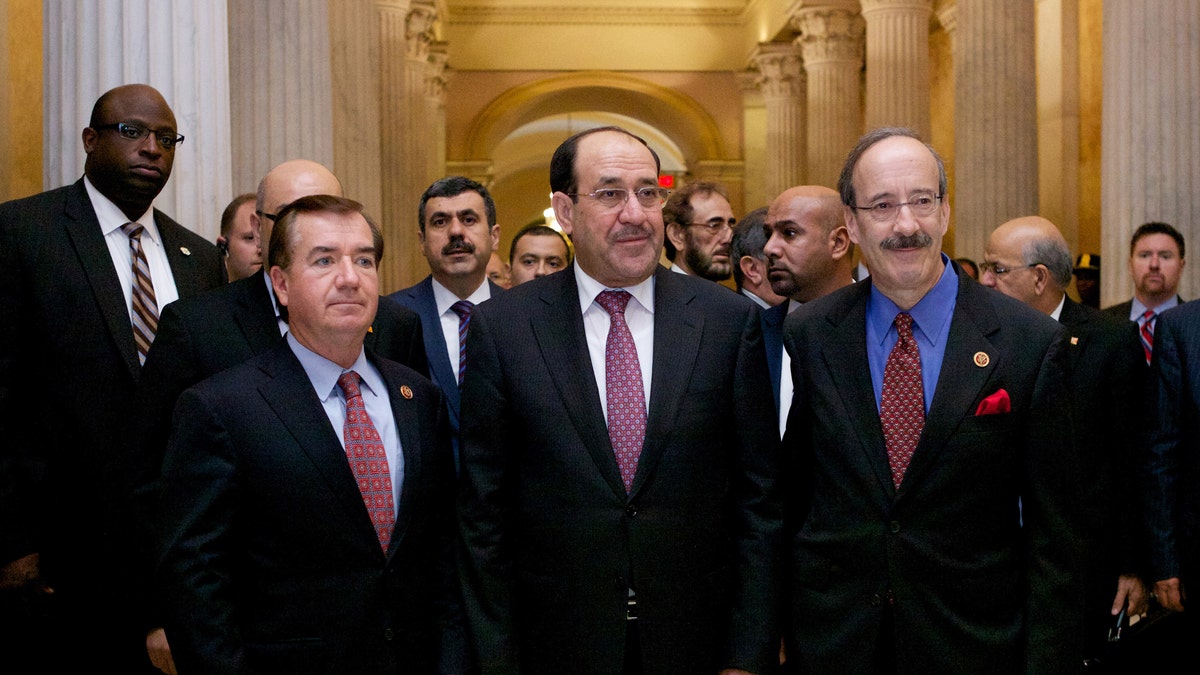
Iraqi Prime Minister Nouri al-Maliki, center, walks with the House Foreign Affairs Committee ranking Democrat Rep. Eliot Engel, D-N.Y., right, and the committee's chairman Rep. Ed Royce, R-Calif. in Washington, Wednesday, Oct. 30, 2013, before their meeting. (AP)
Iraqi Prime Minister Nouri al-Maliki is expected to appeal to President Obama Friday for more U.S. assistance in beating back the bloody insurgency consuming his country.
The White House hasn't indicated whether it will grant al-Maliki's request for additional weapons, help with intelligence and other assistance. The United States already provides military aid to Iraq, the legacy of an unpopular war that already cost Americans nearly 4,500 troops and more than $700 billion. It's unclear what more Obama will be willing to give.
Al-Maliki argues U.S. assistance is vital to help push back the bloodshed that has spiked across his country since U.S. troops left at the end of 2011.
The withdrawal came after al-Maliki's government refused to let U.S. forces remain in Iraq with legal immunity that the Obama administration insisted was necessary to protect troops. Obama had campaigned on ending the nearly nine-year war in Iraq and took the opportunity offered by the legal dispute to pull all troops out.
Sunni Muslim insurgents who had been mostly silenced under the U.S. presence lashed out once the American forces were gone, angered by a widespread belief that Sunnis have been sidelined by Iraq's Shiite-led government. Indiscriminate violence has continued to rise, with the United Nations saying Friday that 979 Iraqis were killed last month alone -- 852 civilians and 127 were security forces -- and nearly 2,000 more injured.
"The terrorists found a second chance," al-Maliki said in a speech Thursday at the U.S. Institute of Peace. He said the violence has been fueled by the neighboring Syrian civil war, although he acknowledged that homegrown insurgents are to blame for the vast number of car bombs, suicide bombings and drive-by shootings that have roiled the nation.
"If the situation in Iraq is not well treated, it will be disastrous for the whole world," said al-Maliki, whose comments were translated from Arabic. "Terrorism does not know a single religion, or confession, or a single border. They carry their rotten ideas everywhere. They carry bad ideas instead of flowers. Al-Qaida is a dirty wind that wants to spread worldwide."
Al-Maliki's Oval Office visit with Obama will be their first meeting since December 2011, six days before the last American troops left Iraq. At the time, Obama pledged the U.S. would remain committed to the government they left behind, and helped create.
Obama spokesman Jay Carney, asked about criticisms of al-Maliki for failing to govern inclusively, said the president will raise concerns about Iraq's violence with the prime minister. "And inclusive democratic governance is a key piece of the picture there and always has been," he said.
"The importance of that dialogue between the different parties and the different political factions cannot be overstated when it comes to resolving these issues peacefully as opposed to through violence," Carney said. "What's important to remember, though, is that the violence we're talking about, the attacks we're talking about, are not coming from within the political system. They're coming from al-Qaida and its affiliates."
Carney said the United States considers Iraq and essential partner in fighting terrorism, and that security assistance is necessary "in this fight against a common enemy." But Carney wouldn't comment on whether Obama would approve more spending.




